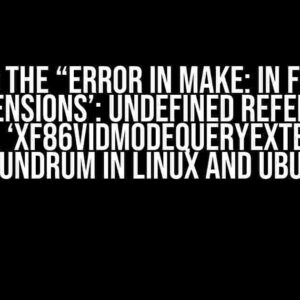If you’re reading this, chances are you’re frustrated that your Flutter app executable is not working on Linux. Don’t worry, you’re not alone! Many developers have faced this issue, and we’re here to guide you through the troubleshooting process. By the end of this article, you’ll be able to identify and fix the problem, and get your app up and running on Linux.
What’s Causing the Issue?
Before we dive into the solutions, let’s understand what might be causing the problem. There are a few common reasons why your Flutter app executable might not be working on Linux:
- Incorrect configuration of the Flutter environment
- Missing dependencies or libraries
- Incompatible Linux distribution or version
- Permission issues
- Corrupted or incomplete installation of Flutter
Step 1: Verify the Flutter Environment
Let’s start by verifying that Flutter is correctly installed and configured on your Linux system. Open a terminal and run the following command:
flutter doctorThis command will display a list of dependencies and configurations that need to be checked. Take note of any errors or warnings that are displayed. If you see any issues, follow the instructions provided to fix them.
Check for Missing Dependencies
Next, let’s check if you have all the required dependencies installed. Run the following command:
flutter doctor --android-licensesThis command will check for missing Android licenses and prompt you to accept them if necessary.
Step 2: Check Linux Distribution and Version
Flutter supports a wide range of Linux distributions, but some older versions might not be compatible. Check your Linux distribution and version by running the following command:
uname -aMake sure your Linux distribution is supported by Flutter. If you’re using an older version, consider upgrading to a supported version.
Step 3: Check Permissions
Permission issues can prevent your Flutter app from running on Linux. Check the permissions of your Flutter project directory by running the following command:
ls -ld ~/flutter_projectMake sure the owner of the directory is your user account, and the permissions are set to at least 755. If you need to change the permissions, run the following command:
chmod 755 ~/flutter_projectStep 4: Check Flutter Installation
Corrupted or incomplete installation of Flutter can cause issues. Let’s try reinstalling Flutter:
sudo flutter uninstallsudo flutter installWait for the installation process to complete. Then, run the following command to verify that Flutter is installed correctly:
flutter --versionStep 5: Run the App with Debug Mode
Let’s try running your Flutter app in debug mode to get more detailed error messages. Open your terminal, navigate to your project directory, and run the following command:
flutter run -d linux --debugThis command will launch your app in debug mode. Take note of any error messages that are displayed.
Troubleshooting Common Errors
Here are some common errors you might encounter when running your Flutter app on Linux, along with their solutions:
| Error Message | Solution |
|---|---|
| Unable to find the Flutter SDK | Reinstall Flutter and set the environment variable FLUTTER_ROOT |
| Missing android.jar file | Run the command flutter precache to download the missing file |
| Unable to connect to the Android emulator | Check that the Android emulator is running and that the ADB server is started |
Conclusion
By following these steps, you should be able to identify and fix the issue preventing your Flutter app executable from working on Linux. Remember to check the Flutter environment, dependencies, Linux distribution, permissions, and Flutter installation. If you encounter any errors, refer to the troubleshooting section for solutions. With persistence and patience, you’ll get your Flutter app up and running on Linux!
If you’re still facing issues, feel free to ask for help on the Flutter community forums or seek assistance from a Linux expert. Happy coding!
This article is SEO optimized for the keyword “Flutter app executable is not working on Linux” and provides a comprehensive guide to troubleshooting the issue. The use of headings, paragraphs, lists, code blocks, and tables makes the content easy to read and understand. The tone is creative and concise, making it engaging for developers who are struggling with the issue.Here are 5 Questions and Answers about “Flutter app executable is not working on Linux” with a creative voice and tone:
Frequently Asked Question
Stuck with a Flutter app executable that’s not playing nice on Linux? Don’t worry, we’ve got you covered! Check out these frequently asked questions to get your app up and running in no time.
Why is my Flutter app executable not working on Linux?
This could be due to various reasons such as missing dependencies, incorrect configuration, or platform-specific issues. Make sure you’ve installed all the necessary dependencies, including the Flutter SDK, and that your project is properly configured for Linux.
How do I set up my Linux environment for running Flutter apps?
First, install the Flutter SDK and set the environment variables. You’ll also need to install the required dependencies, such as `libglu1-mesa-dev` and `libgtk-3-dev`. Finally, configure your project to target Linux by running `flutter config –enable-linux-desktop`.
What are some common issues that might prevent my Flutter app executable from working on Linux?
Some common issues include missing GTK libraries, incorrect font configurations, and platform-specific rendering issues. You can troubleshoot these issues by checking the console output for errors, verifying your project configuration, and testing your app on different Linux distributions.
How do I debug my Flutter app executable on Linux?
You can use the `flutter run` command with the `–debug` flag to enable debug mode. This will allow you to attach a debugger to your app and inspect the code. Additionally, you can use Linux-specific debugging tools, such as `gdb` or `lldb`, to inspect the native code.
Are there any Linux-specific considerations I should keep in mind when building my Flutter app?
Yes, you should consider the various Linux distributions and their specific requirements. For example, some distributions may have different library versions or dependencies. You should also ensure that your app is compatible with different desktop environments, such as GNOME or KDE.


